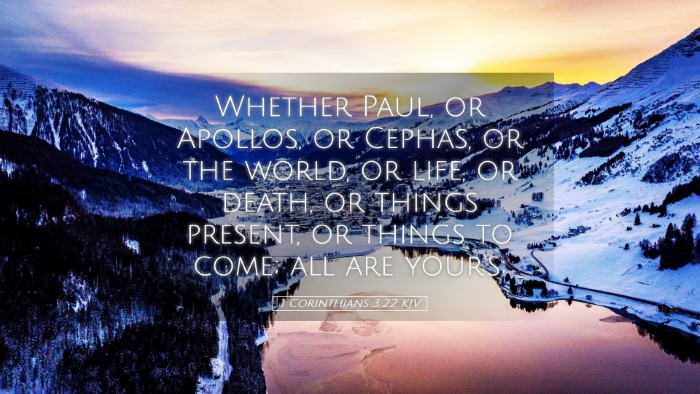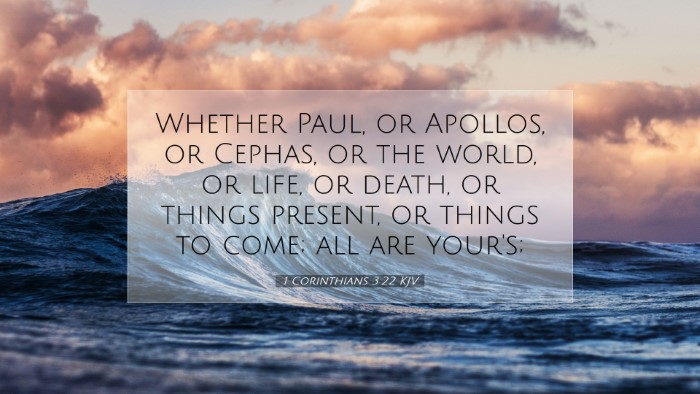Commentary on 1 Corinthians 3:22
Bible Verse: “Whether Paul, or Apollos, or Cephas, or the world, or life, or death, or things present, or things to come; all are yours.”
Introduction
In this passage from 1 Corinthians, the Apostle Paul communicates a profound truth regarding the possession and stewardship of spiritual gifts and leaders within the Church. The verse serves to challenge the prevailing divisiveness among the Corinthians by emphasizing unity in Christ and the believers' inheritance as joint heirs of all things. The commentary integrates insights from Matthew Henry, Albert Barnes, and Adam Clarke, providing a rich theological exploration of this scripture.
Exegesis and Context
This verse sits within a broader section where Paul addresses the factions within the church at Corinth. The Corinthians had divided themselves based on their allegiance to various leaders, including Paul, Apollos, and Cephas (Peter). Paul aims to correct this mindset, reminding them that all leaders and their work belong to the congregation rather than the congregation belonging to them.
Historical Background
Corinth was a city of great wealth, culture, and diversity, and these elements influenced the attitudes of the Church. The believers were prone to pride and rivalry, leading to divisions that undermined their unity in Christ. Paul’s letters were written to address various issues, provide pastoral care, and guide the church towards maturity in faith.
Theological Insights
Unity in Diversity
Matthew Henry emphasizes that Paul’s intention was to stress the collective ownership of spiritual leaders and the spiritual goods they impart. He notes, “All men are yours,” illustrating that believers should neither elevate nor segregate themselves based on personal preferences for different leaders.
Albert Barnes also highlights that all things—persons, life, death, and the universe—belong to the believers in Christ. This ownership is rooted in the redemptive work of Jesus, and Barnes asserts, “It shows that all should work for the common good of the body of Christ.”
Possession and Stewardship
Adam Clarke remarks on the call for maturity among believers. He indicates that the notion of ownership implies the responsibility of stewardship. The Christians at Corinth are to engage with and utilize their spiritual gifts actively for the service of the Church and evangelism, thereby fostering growth both personally and communally.
Application for the Modern Church
Addressing Division
The passage challenges contemporary believers to examine their own tendencies towards favoritism regarding church leaders or movements. It calls for a recognition of the shared nature of spiritual inheritance and the need to work together in unity.
- Promote Collaboration: Leaders within the Church should promote a collaborative spirit, valuing the contributions of all members.
- Encourage Inclusivity: All members of the church should be encouraged to share their gifts, foreseeing the body of Christ as a unified entity.
- Focus on Christ: The primary allegiance should remain to Jesus Christ, whose work transcends any particular leader.
Hope for Believers
This verse provides a message of hope, asserting that regardless of personal circumstances—whether trials in life or facing death—believers possess everything necessary in Christ. Paul asserts that nothing can separate them from the love of God, and all of creation, in its fullness, is gifts bestowed by God for their benefit.
Matthew Henry writes, “This is to comfort them under their troubles, that they have all things and can cheerfully bear all, because they shall overcome all.” Thus, the reminder of their inheritance serves to strengthen their faith and resolve in the face of challenges.
Conclusion
1 Corinthians 3:22 stands as a profound declaration of what it means to be a part of the Church and family of Christ. Drawing from insights by respected theologians like Matthew Henry, Albert Barnes, and Adam Clarke allows us to glean rich understanding of the implications of being heirs of all things. Pastors, theologians, and students should seek to integrate this message into their ministry, ensuring that unity, stewardship, and the communal nature of faith are prioritized in the life of the Church.
Through scripture, we are reminded of our collective identity in Christ, urging the Church to rise above divisions and embrace the fullness of life offered in Him, encompassing all leaders and all circumstances as part of our shared Christian experience.


